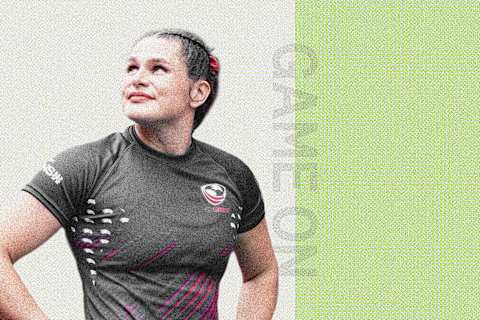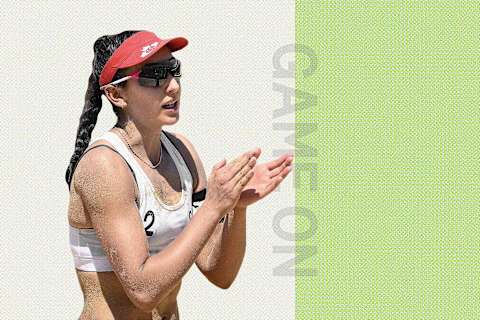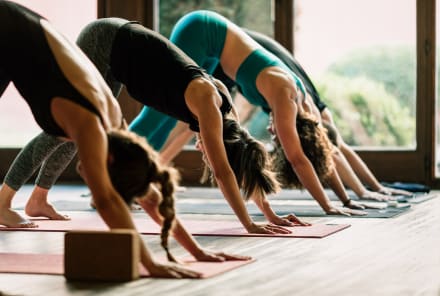Advertisement
What Makes An Elite-Level Teammate? Here's What The Best Athletes In The World Say


Talk to most athletes, and some of the first people they'll credit their success to are their teammates. In fact, most of the athletes I spoke to for this issue and Game On series had similar sentiments. During these months of conversations that I've had with athletes, one thing became clear: No matter whether it's an individual or team sport, the people athletes surround themselves with are critical to their success.
Of course, most of us have teammates in some capacity, whether they're called that explicitly or not. From family members and those in our communities to co-workers, we all have teams of people we need to show up for—and, hopefully, who show up for us in return. We all have people who need us to be good teammates.
And the thing is, being a "good teammate" is something of a learned behavior. For example, research shows that playing team sports in youth can help kids learn valuable lessons, such as appropriately reacting to negative outcomes, offering help to others, asking for support, sharing, and operating as a member of a larger group.
It's also something one can continue to learn throughout one's life—and it's always a good time for a refresher. So I spoke with athletes of all sports, ages, and levels to understand the qualities that make good team players. Here's what they had to say.
Know how to show up as a leader
“As the former captain of the San Diego Wave Football Club and a leader of the national team, it's just about being there, being willing to listen, share experiences with them, and being able to find common ground. I have a teammate who is maybe half my age, but being able to communicate to her that we are peers—and especially when we step on that field, we are equals.
"Everyone has a purpose and has their role on a team. Each role is just as important as the others." —USA soccer legend and Olympic gold medalist Alex Morgan
Meet teammates where they are
"I just try to meet everyone where they are. Some cases that means not pushing someone too hard—and instead, just really being there for them. If they need a shoulder to cry on, here you go. If they need someone to motivate them, I'm here for you. So just meet folks where they are." —Olympic gold medal winner and history-making gymnast Gabby Douglas

Work to build each other up & instill confidence
"I think for me, a great team[mate] is someone that's going to instill confidence in you and build you up. Especially in beach volleyball, you need your other half on the court to be successful.
"I've seen situations where someone might get a bad set, and the teammate will roll their eyes. It's like, Why are you tearing down your partner? Your partner is the one person who you need the most to succeed at this.
"So I think a good teammate is someone who instills that confidence and trust in you during those hard times, like, say, when you aren't playing your best game. A good time is going to be someone who is still there, and they'll still have utmost trust." —Team USA beach volleyball player Kristen Nuss

Embrace others for who they are & what they can contribute to the team
"I think what's fun about being on a team is having those different personalities around you. You need the person who is going to go quiet and wants to get in their head before a game. Or myself before a game, I'm loud, I want to dance, and I want to connect with people. So it's important to recognize there are so many different teammates and personalities that make up a team—and that's what makes a team special. You don't want all the same athletes out there.
"Being a good teammate is also about helping others rise up as well. For example, what I've been trying to do on social media has been for myself, but it's also been for my teammates. I try to bring them into any video I can or encourage them to post.
"My teammate once told me 'a rising tide lifts all boats,' which is a great way to think about it. It's about lifting up others, lifting my teammates, and making them feel good." —Team USA rugby center & TikTok star Ilona Maher
Show vulnerability and be honest
"It's really important to show vulnerability and honesty with your teammate. Because the truth is sometimes you don't want to show up and you have to say that to them. You have to be honest. And those aren't fun things to say. Nobody wants to be weak, especially in the sports world.
"But it's OK to be vulnerable. That's when we [my teammate Kristen and I] have gotten closer—those moments when one of us is sharing, Hey, I'm so unbelievably nervous right now, and I need your help. That creates a different type of bond." —Team USA beach volleyball player Taryn Kloth
Be each other's greatest cheerleaders
"My teammates are what keep me going. They are my second family. We're together hours a day. I think a good teammate is someone that picks you up when you're down. That always wants the best for you. Yes, even if that means that they're beating me—I still am proud and happy for them because I see the work that they put in every single day.
"My teammates make me a better person. I think that's a big part of being a teammate—both on and off the racecourse. We're competitive. We're driven. We push each other to be better in all aspects of our lives." —Paralympian and triathlete Melissa Stockwell
Show up with an infectious & positive attitude
"I think there's a lot of good qualities that go into a teammate, but I think one of the biggest ones is recognizing that attitudes are contagious. So, which attitude are you spreading? What attitude do you want to be known for spreading?
"This is, by no means, to imply that you need to walk on, in my case, the pool deck every day being happy and positive and bubbly—[but it's about] knowing that you still have a responsibility as a teammate to uplift.
"That can actually really help you as well. There were many days in practice where I went in and I wasn't feeling it—I was sore, I didn't want to be there—but the second I started amping my teammates up, I started amping myself up. It's a beautiful cycle." — Olympic gold medalist and world champion swimmer Missy Franklin
Create empathetic bonds with those around you
"I'm thankful that I had that teammate experience growing up as a kid because it taught me how to work well with others, especially when you come from different backgrounds.
"I think being a good teammate is first acknowledging that not everyone grew up the same way as you or has the same way of thinking as you. I think just on a basic level, understanding that helps you have empathy.
"I know my favorite teammates just had the most empathy and respect for everyone around them. It didn't matter if they disagreed with someone, they always knew that that person was still important enough to contribute something to the team." —Team USA volleyball player, Gold & Silver medalist Chiaka Ogbogu

Build a foundation of trust through honesty
"Compassion and respect will get you very far in life with people that you work with. But I think the most important thing in a good teammate is vulnerability. I don't think you can build trust or that foundation without vulnerability.
"It's scary to kind of show your true colors. But when you're on this journey together—and it's a big journey with big goals—you have to be able to get into the nitty-gritty. You have to talk about big, scary things: What are you afraid of? What makes you tick? When things are going bad, what is the best way to talk to you and help you? What are the things you need?
"It takes some self-awareness, but if you can verbalize that and be honest and vulnerable, that creates a foundation of trust." —Beach volleyball Olympic silver medalist Melissa Humana-Paredes
Be someone who puts the team before your own ego
"Someone who is selfless, puts the team before themselves, and wants the best for the people that they're working with. It's important to share that common goal, whatever that goal may be for your team or for your organization or for your business.
"I think that's something that I really try to hone in on, especially leading a young group. It's important that they can see that the oldest player on the team is willing to serve them and to go out of their way to make sure they're all right.
"It just makes the environment and the culture better. I think that's so huge for people in positions of leadership. Your crew has to know you care for them." — Professional basketball player & Olympian Cierra Burdick

These 6 Simple Steps Will Make The Age Of Aquarius Your Best Era Yet
Perpetua Neo, DClinPsy

These 6 Simple Steps Will Make The Age Of Aquarius Your Best Era Yet
Perpetua Neo, DClinPsy

These 6 Simple Steps Will Make The Age Of Aquarius Your Best Era Yet
Perpetua Neo, DClinPsy

These 6 Simple Steps Will Make The Age Of Aquarius Your Best Era Yet
Perpetua Neo, DClinPsy









